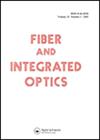《光纤源与放大器》特刊导言
IF 2.2
4区 物理与天体物理
Q2 OPTICS
引用次数: 0
摘要
除了作为传输链路,光纤还被用于实现几种类型的光子器件,即光放大器、激光器和宽带光源。超快光纤激光器有可能使超短脉冲广泛应用于不同的科学技术领域。特别是静止耗散超短脉冲和脉动耗散超短脉冲以及高能量耗散孤子共振脉冲近年来引起了被动锁模光纤激光器研究人员的广泛关注。超连续光纤源在光通信、光谱学、光学相干层析成像、光学频率测量等领域也非常有用。在光学放大器方面,人们开发了各种各样的特种光纤来替代传统的掺铒光纤。特别是,对使用各种玻璃主体和共掺杂材料(如二氧化硅、氟锆酸盐、硫族化合物、铋、铝、磷、镧等)的edf进行了广泛的研究。其中一些材料具有更宽的发射带宽,适用于波分复用(WDM)系统。本期特刊汇集了几位国际专家,讨论了不同类型光纤源和放大器的设计、制造和应用的最新研究进展和趋势。提交了六篇论文,提供了一个很好的视角。其中两篇已经发表在本刊第39卷第4期。Yuri Barmenkov等人的一篇论文(https://doi.org/10.1080/01468030.2020)。1826608),报道了一种自制的用于激光应用的钬铝锗共掺杂二氧化硅光纤的基本光谱特性。另一篇论文由Khurram Qureshi (https://doi.org/10.1080/ 01468030.2020.1829753)提出并演示了一种简单的半导体光纤环形激光器设计,该激光器覆盖了广泛的可调谐范围,包括L波段和扩展L波段。第三篇论文发表在本期特刊上,综述了考虑两种不同腔体结构,即光纤环(FR)和Fabry-Perot (FP)光纤与集成光学2020,VOL. 39, no . 5-6, 213-214 https://doi.org/10.1080/01468030.2020.1860440的偏振维持被动锁模掺镱激光器的行为的最新研究本文章由计算机程序翻译,如有差异,请以英文原文为准。
Introduction to the Special Issue on Optical Fiber Sources and Amplifiers
Besides serving as transmission links, optical fibers have been used also to realize several types of photonic devices, namely optical amplifiers, lasers, and broadband sources. Ultrafast fiber lasers have the potential to make applications of ultrashort pulses widespread in different areas of science and technology. In particular, both stationary and pulsating dissipative ultrashort pulses as well as high energy dissipative soliton resonance pulses have attracted recently the attention of many researchers working with passively mode-locked fiber lasers. Supercontinuum fiber sources were found also to be very useful in several areas, such as optical communications, spectroscopy, optical coherence tomography, optical frequency metrology, etc. Concerning optical amplifiers, different kinds of specialty optical fibers have been developed as alternatives to conventional erbium-doped fibers (EDFs). In particular, extensive research has been done on EDFs using various glass host and co-dopant materials such as silica, fluorozirconate, chalcogenides, bismuth, aluminum, phosphorous, lanthanum, etc. Some of these materials have wider emission bandwidth that is suitable for wavelength-division multiplexing (WDM) systems. This Special Issue gathers several international experts to discuss the latest research advances and trends concerning the design, fabrication, and application of different types of optical fiber sources and amplifiers. Six papers have been submitted, which provide a nice perspective of this area. Two of them were already published in volume 39, issue 4 of this journal. One of these papers, by Yuri Barmenkov et al. (https://doi.org/10.1080/01468030.2020. 1826608), reports on the basic spectroscopic properties of a home-made holmium-aluminum-germanium co-doped silica fiber, designed for laser applications. The other paper, by Khurram Qureshi (https://doi.org/10.1080/ 01468030.2020.1829753), proposes and demonstrates a simple design of semiconductor fiber ring laser covering a broad tunable range, comprising L and extended L bands. A third paper submitted to this Special Issue provides a review of recent investigations on the behavior of a polarizationmaintaining passively mode-locked ytterbium-doped laser considering two different cavity configurations, namely fiber-ring (FR) and Fabry-Perot (FP) FIBER AND INTEGRATED OPTICS 2020, VOL. 39, NOS. 5–6, 213–214 https://doi.org/10.1080/01468030.2020.1860440
求助全文
通过发布文献求助,成功后即可免费获取论文全文。
去求助
来源期刊
CiteScore
3.40
自引率
0.00%
发文量
4
审稿时长
>12 weeks
期刊介绍:
Fiber and Integrated Optics , now incorporating the International Journal of Optoelectronics, is an international bimonthly journal that disseminates significant developments and in-depth surveys in the fields of fiber and integrated optics. The journal is unique in bridging the major disciplines relevant to optical fibers and electro-optical devices. This results in a balanced presentation of basic research, systems applications, and economics. For more than a decade, Fiber and Integrated Optics has been a valuable forum for scientists, engineers, manufacturers, and the business community to exchange and discuss techno-economic advances in the field.

 求助内容:
求助内容: 应助结果提醒方式:
应助结果提醒方式:


